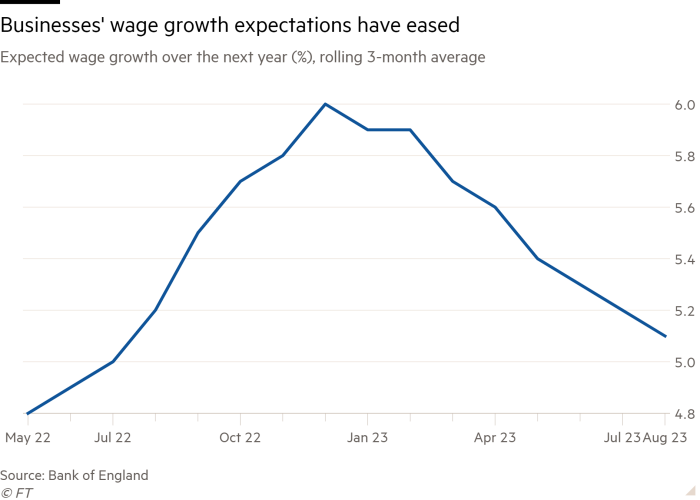UK businesses expect inflation and wage growth to ease, according to a closely watched monthly survey by the Bank of England, providing some relief for policymakers ahead of the interest rate decision later this month.
Output prices are expected to increase by 4.9 per cent over the next 12 months, according to August’s Decision Maker Panel, a survey of UK chief financial officers, published on Thursday. The figure, based on a three-month rolling average, represents a fall of 0.5 percentage points from July and well below the peak of 6.6 per cent in September last year.
The outlook for wage growth also fell to an average of 5.1 per cent, continuing a downward trend from a high of 6 per cent at the end of 2022.
James Smith, an economist at ING, said the data provided “good news” for the central bank’s rate-setting committee. “With two weeks to go until the next Bank of England rate decision, there’s a growing sense that the rate hike cycle is reaching its peak and that story has been offered further ammunition by the latest Decision Maker Panel data,” he added.

The outlook for both output price inflation and wage growth was well below the figures reported for the last 12 months of 7.4 per cent and 6.9 per cent respectively, the survey showed.
The findings reflect comments by Andrew Bailey, the BoE’s governor, earlier this week as he signalled a further interest rate rise may not be necessary.
“The question now is as headline inflation comes down . . . will we see inflation expectations continue to come down? . . . and will that be reflected into wage bargaining?” he told MPs, noting that interest rates were now “much nearer” their peak than before.
The markets still expect the central bank to raise interest rates by a quarter point this month from 5.25 per cent.
The survey found that more than half of businesses still report problems recruiting, a factor that has led to recent strong wage growth, although this has declined from 70 per cent of chief financial officers at the start of the year.
More evidence of a cooling labour market came from data published by the Office for National Statistics on Thursday. It showed that 10 per cent of businesses reported that hourly wages had increased month on month in July, down from one in four in April.
